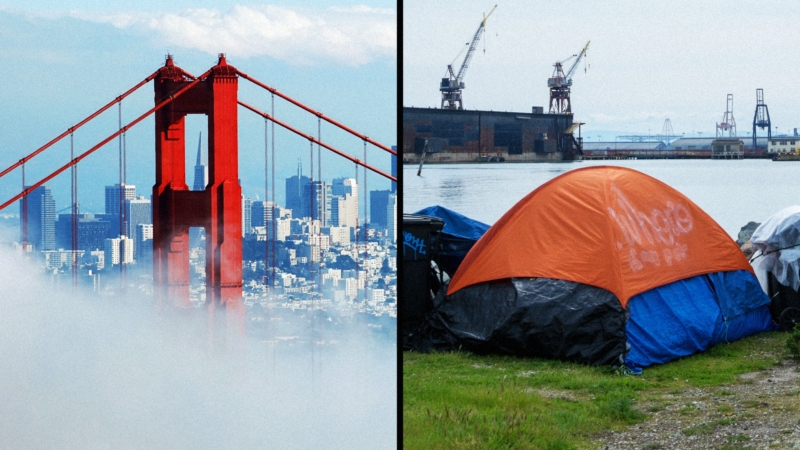San Francisco's Got Problems. There's No Need To Exaggerate Them for Political Reasons.
If you don't like San Francisco, that's fine, but don't tell tall tales about it.

To hear conservatives describe the state of affairs in San Francisco, you'd think the City by the Bay is a harrowing dystopia along the lines of San Salvador, Juarez, St. Louis or Detroit. I can't tell you how many people have warned me against spending time there—or talked about the "poop app" that helps visitors avoid human feces on the sidewalks.
"San Francisco is sunk in a rancid drug-ravaged pit of human misery and city leaders have no idea how to pull themselves out of it," wrote David Marcus in his Fox News column last year. He knows why: "(B)ecause the progressive lunatics running the city believe that every criminal is a victim."
This week, I read a Twitter debate about which American city would essentially collapse under the weight of its own lunacy. Predictably, San Francisco topped the list. "Look what's happened to San Francisco," Donald Trump said during a 2020 campaign stop in Bakersfield. "It's worse than a slum, there's no slum like that."
I suspect that many of the San Francisco doom-tellers haven't been there, but even many who have joined the chorus. Bay Area native Michael Shellenberger's well-known book is called San Fransicko: Why Progressives Ruin Cities. He makes some solid points—progressives do wreck everything they touch and San Francisco has tons of problems—but his title promotes the "it's a nightmare" theme.
I travel to San Francisco regularly and have visited almost every corner of the city. I spent most of last week there for a wedding on Nob Hill and traipsed around several neighborhoods: Chinatown, North Beach, Alamo Square, and South of Market (SoMa). Not only did I live to tell about it, but left with warm fuzzies even after wandering its streets late at night.
San Francisco remains (arguably) the most beautiful city in the country. Its parks are lovely and mostly orderly and clean. On Sunday, we played miniature golf and frequented food trucks, along with hundreds of young families. People were generally friendly and the restaurants and nightlife were fabulous. Most neighborhoods are surprisingly quiet and safe.
The city's critics aren't entirely wrong, of course. Locals warned us not to leave anything in our cars given surging property crimes. The Tenderloin—the notoriously downtrodden downtown neighborhood—is an open sewer of drug dealing and panhandling, just as critics say. Homeless tents line a portion of Market Street near the main shopping drag. But is it fair to define an entire city that way?
Whenever I mention this, people misunderstand. Yes, some portions of the city are a mess. Yes, the city faces major property crime and homelessness problems. Just this week, the National Guard and California Highway Patrol were sent in to shut down open-air drug markets. Major retailers are exiting because of the theft problem. But conservatives undermine their case when they overstate things.
Simply put, conservatives bash San Francisco because of the city's progressive politics, just as liberals portray Republican states such as Texas as redoubts of sexism and racism. For instance, California lawmakers have banned official travel to 22 supposedly backward states. In both cases, politically minded people embrace stupid narratives that confirm their biases.
The San Francisco Chronicle looked at San Francisco's crime data in 2022 and found that crime rates soared after lockdowns temporarily turned the city into a ghost town, but overall rates have been in a downward trend over five years. The murder rate has increased since the end of COVID, but the city's murder rate is "towards the bottom for major cities," Police Chief Bill Scott told a local CNN affiliate.
It's a mixed bag, but my sense is the city government's lackadaisical approach toward lower-level crime and homelessness has created a real sense of civic disorder. Many property crimes aren't reported, so the crime problem is deeper than the data suggest. Residents understandably are feeling jittery about their overall safety.
So after a high-profile killing—such as when tech entrepreneur Bob Lee was stabbed to death this month on a downtown street—it feeds the narrative of a terribly dangerous city, even if this might not have been a random attack. None of my caveats are meant to downplay the seriousness of the crime problem but to put the matter in perspective.
I lived in Washington, D.C., in the 1970s and 1980s—when the murder epidemic was so severe that local newspapers published a death toll on the front pages every day. Crime rates have fallen dramatically nationwide since then, but have increased in recent years. Crime and homelessness partly explain why San Francisco has lost so much population, but crime isn't nearly as bad as those days.
Marcus lives in West Virginia, which has endured an appalling opioid overdose crisis. Yet that hardly defines an entire state. Isn't it better to figure out how to deal with these problems rather than just score partisan political points? My sense in San Francisco's critics despise the city's politics, so they jump on every bad event to conform to their narrative.
San Francisco is unlikely to ever become a conservative paradise, but even the politics there is self-correcting. Last year, voters recalled their soft-on-crime district attorney Chesa Boudin. The newly appointed DA has vowed to clean up the streets. Note the National Guard intervention mentioned above. If you don't like San Francisco, that's fine, but don't spread tall tales about it.
This column was first published in The Orange County Register.
